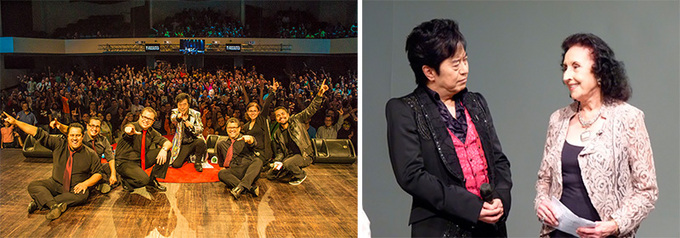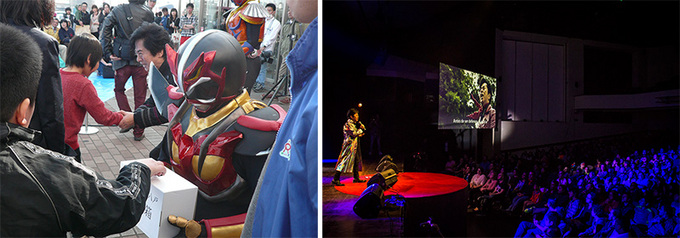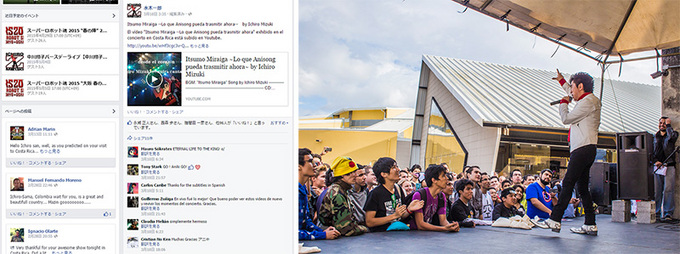¡Pura Vida! Live Performance by Ichiro Mizuki in Costa Rica
Ichiro Mizuki (Anime Song Singer)
The Japan Foundation organized an anime song (anisong) live performance and talk show featuring the king of anisong in Japan, the singer Ichiro Mizuki, as an opening event of the Japan-SICA Friendship Year 2015, a project celebrating the 80th anniversary of the establishment of diplomatic relations between Japan and five Central American countries (Guatemala, El Salvador, Honduras, Nicaragua, and Costa Rica). The events took place in the capital of Costa Rica, San Jose, parallel to the international traveling exhibition JAPAN: Kingdom of Characters. In this interview, Mr. Mizuki, who is known as Aniki (which means "big brother" in Japanese) by his fans all over the world, answers questions about the cultural exchange that took place in Costa Rica and his plans for the future.
―You have done numerous overseas performances, but the event in Costa Rica was your first concert in Central and South America. What are your impressions of Latin America--its land and people--and your fan base there?
Mizuki: Latin America has abundant nature and colorful cityscapes. Its people are easygoing, and overall I enjoyed my visit there. At the live event, "Aniki" echoed throughout the venue before the concert started, and the excitement exceeded my expectations. Mazinger Z is so extremely popular in Costa Rica that apparently there are people who have built huge hand-made models of the robot on their roofs. I was told that my songs from Mazinger Z, Space Pirate Captain Harlock, and the Kamen Rider series are also very popular, and that I have a large fan base through three generations. The audience of my concert was composed of a wide range of fans--young children, "cosplayers" wearing three-meter-tall costumes of the Great Mazinger, and young people sporting identical "Aniki" t-shirts. I was extremely happy when the audience stood up and sang along with me. That is apparently not a very common sight in Costa Rica because, unlike the typical image of Latin Americans, the national character of Costa Ricans is somewhat closer to that of Japanese, and they are reserved and relatively shy. "¡Pura Vida!" is a popular greeting unique to Costa Rica. Its literal English translation is "pure life," but the phrase actually has various other meanings like "all is okay" or "good." In my experience, it was a magic phrase that opened doors everywhere we went.

Left: The enthusiastic audience responding to the singer
Right: The artist's overwhelming presence on the stage
―Your visit to Costa Rica gained a great deal of publicity thanks to your appearance on Teleclub, the Guinness World Record holder for the longest running TV educational show and the joint performance with the popular Costa Rican group Band 4 All. What are your impressions of the joint performance?
Mizuki: Although I met both Ines Sanchez, the host of Teleclub, and the members of Band 4 All for the first time, we connected immediately as professionals, just with our eyes. I think we were able to hit it off right away because of our long professional careers. In music, there are no borders. I promised the members of Band 4 All that we perform together again if I get an opportunity to hold another live concert in Costa Rica.

Left: A photo taken after the encore with the members of Band 4 All and the audience in the background
Right: Ines Sanchez, popular TV show presenter, Costa Rican equivalent to Tetsuko Kuroyanagi
―At the concert, for an encore you performed the theme song of "Tohoku Gasshin Miraigar," a superhero who unites the powers of the six prefectures of Tohoku. Why did you choose that song, and how did the audience respond to it?
Mizuki: I have a repertoire of roughly 1,200 songs; most of them are theme songs of superheroes. Anime songs about superheroes are tightly packed with stories of justice, love, friendship, and hope. Most importantly, they have the power to make people smile. "Tohoku Gasshin Miraigar" was born from the desire to support the future of our children. When I visited the disaster-stricken areas, people told me that the song gave them courage and put them in a more positive frame of mind. By listening to the song, they could smile for the first time after a long time. These made me very happy. I was the one who felt empowered by the experience, actually. The troops who engaged in search and rescue activities, the volunteers who gathered from all over the world, the people who supported and cared for each other...every single person who spared no effort working for the recovery and reconstruction of the areas struck by the Great East Japan Earthquake is a hero. Children's smiling faces, too, often empower me. I chose that specific song for my concert in Costa Rica because I thought about what I could do for the recovery and reconstruction of the disaster-stricken areas as an anisong artist and assumed that I should convey to the audience my feelings and impressions from my visit to the Tohoku region. The song itself is almost unknown in Costa Rica, and I felt somewhat apprehensive about my choice. Central America, too, however, is an earthquake-prone region, so the audience appeared to sympathize with the emotions expressed in the song. They intently watched the short video that conveyed the hopes for recovery and the music video of "Tohoku Gasshin Miraigar" with Spanish subtitles, and I think they perceived its significance.

Left: A scene from the artist's visit to the disaster-stricken areas
Right: Screening of the promotional video of "Tohoku Gasshin Miraigar" with Spanish subtitles
―I get the impression that you are always very considerate of the feelings of your fans and place a high value on two-way communication. You personally interact with your followers all over the world on a daily basis through Twitter and Facebook. Is there anything in particular that you keep in mind in your international exchange activities?
Mizuki: The most important thing for me is to express my ideas with my own words while taking into account the opinions of my audience. This concept is not limited just to international exchange. It means that the ability to properly convey one's emotions is in the core of communication. For instance, even when I communicate with people who speak different languages, I believe that if I speak from the heart, my words will reach them. Also, I always want to treat my fans fairly, regardless of who they are. When I was asked for an autograph and a photo during the concert in Costa Rica, I explained that I wanted to treat everyone equally so I could not possibly give an autograph to just one person. The audience responded with cheers. I felt that they understood my motives.

Left: Ichiro Mizuki often posts on SNS for his overseas fans on social networks
Right: The audience in the front row staring intently at the artist
―Today, approximately four million people around the world are studying Japanese. Many of them became fascinated with Japan after watching anime series or listening to anisongs. What kind of activities do you want to take on, using the amazing power of anisongs?
Mizuki: Anisongs are a treasure that Japan should be proud. They are the fruition of our meticulous efforts to create high-quality music for children, while taking into account that children listen and enjoy them at an age when they are very susceptible to external influences. I believe this is the reason these songs remain in their hearts even after they grow up. I am very happy that many anisongs created through such painstaking efforts have been loved by children abroad for some several decades. Even if a song is translated into the local language, fans would prefer to listen to the original Japanese version. As a child, I was fascinated by Western music, which prompted me to learn English. Today, I am told that anisongs inspire many people to study Japanese. The messages embedded in anisongs transcend generational and national borders. Also, when we sing anisongs, we articulate the words very clearly and distinctly. Perhaps, that is why anisongs have become useful materials for studying Japanese. I believe that anisongs have an enormous power to fascinate people all over the world. So I agreed with the aim of the Japan Foundation to "expand Japan's fanbase around the world," and felt an urge to collaborate with them. Back in the beginning of my career, the anisong genre was not widely recognized by the general public, but today, 40 years later, the word anisong has become a universal language. There are many people all over the world who have grown up listening to my voice. In the future, I wish to visit as many countries as possible and unleash the power of anisongs not only on those eagerly looking forward to my live performances, but also on those who are not even aware of the name "Ichiro Mizuki." In doing so, I cannot wait to do the spiritual back-and-forth play between me and my audience beyond all kinds of borders. I find deep emotional significance in the fact that, as an anisong singer, I have reached a place where I can play an important role in international exchange. I would like to tell all people who are striving to achieve a goal how crucial it is to not give up on your dreams, but to continue with tenacity. As the proverb goes, "Continuity is the father of success" As for myself, I intend to continue singing anisongs--the songs that inspire dreams, hopes, and courage--for as long as my voice will let me.
Ichiro Mizuki
An anisong pioneer, Ichiro Mizuki continues to ride the peak of his fame as the undisputed king of the anime song genre. In 1999, he made history by singing 1,000 songs within 24 hours. Mizuki has an amazing repertoire of over 1,200 anisongs. His Wikipedia entry is translated into 90 languages, a record for a Japanese person and a testament of his great international popularity. A reading material about his half-lifetime titled "Anime Song no Teio ni - Mizuki Ichiro (Becoming the King of Anisong: Ichiro Mizuki)" was published in the 2015 edition of a Moral Education course material for elementary schools.
Core works
• "Mazinger Z" (Theme song of Mazinger Z, 1972)
• "Babel II" (Theme song of Babel II, 1973)
• "Ore wa Great Mazinger" (Theme song of Great Mazinger, 1974)
• "Set up Kamen Rider X" (1974 Theme song of Kamen Rider X)
• "Kamen Rider Stronger no Uta" (Theme song of Kamen Rider Stronger, 1975)
• "Tekkaman no Uta" (Theme song of Tekkaman: The Space Knight, 1975)
• "Kotetsu Jeeg no Uta" (Theme song of Steel Jeeg, 1975)
• "The Theme of Combattler V" (Theme song of Super Electromagnetic Robot Combattler V, 1976)
• "Captain Harlock" (Theme song of Space Pirate Captain Harlock, 1978)
• "Lupin III - Love Theme" (Theme song of Lupin III, 1978)
• "Moero! Kamen Rider" (Theme song of Kamen Rider [Skyrider], 1979)
• "Zebraman no Uta" (Theme song of Zebraman, 2004)
• "Tao" (Ending theme song of Jyuken sentai Gekiranger, 2007) ...and many more
Ichiro Mizuki Official Facebook Page

Back Issues
- 2025.5. 1 Ukrainian-Japanese I…
- 2024.11. 1 Placed together, we …
- 2024.5.24 The 50th Japan Found…
- 2024.5.24 The 50th Japan Found…
- 2024.5. 2 People-to-People Exc…
- 2024.2.19 Movie Theaters aroun…
- 2024.2.19 Movie Theaters aroun…
- 2023.4.24 The 49th Japan Found…
- 2022.10.24 Inner Diversity <2> …
- 2022.10. 5 Living Together with…

